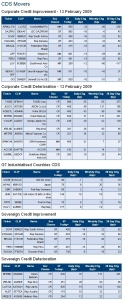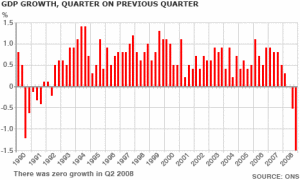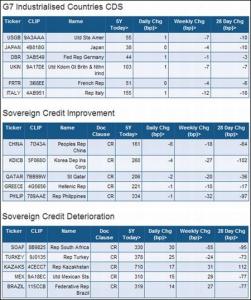CDS市場で異変あり、ターゲットにされたモルガン・スタンレー ― 2011/10/05 08:49
<関連記事引用>
▼米社債保証コスト低下-EUが銀行資本増強を検討との報道で (1)
http://www.bloomberg.co.jp/apps/news?pid=90920015&sid=apwZzvbEK.hk
10月4日(ブルームバーグ):4日のクレジット・デフォルト・スワップ(CDS)市場では、モルガン・スタンレーなど米企業の社債保証コストが下げに転じた。欧州連合(EU)当局者が銀行資本増強で協調する方法について検討しているとの英紙フィナンシャル・タイムズ(FT)の報道に反応した。
フェニックス・パートナーズ・グループによると、モルガン・スタンレー債のCDSスプレッドはニューヨーク時間午後4時23分(日本時間5日午前5時23分)現在、23ベーシスポイント(bp、1bp=0.01%)低下し560bp。一時は2008年10月以来の高水準である650bpまで上昇していた。
マークイット・グループによれば、北米企業の信用リスクの指標であるマークイットCDX北米投資適格指数のスプレッドは、ニューヨーク時間午後4時43分現在、2.6bp低下の147.5bp。一時は154.1bpと、09年5月以来の高水準に達した。
フェニックスによれば、ゴールドマン・サックス・グループ債のCDSスプレッドは20.4bp上昇の415bp。バンク・オブ・アメリカ(BOA)優先債のCDSスプレッドは8.4bp上げて465bp。早い段階では484.5bpまで上昇していた。
▼Mスタンレーなど大手米銀のCDSスプレッドが拡大
2011年 10月 5日 00:28 JST
http://jp.reuters.com/article/businessNews/idJPJAPAN-23480220111004
[ニューヨーク 4日 ロイター] 4日のクレジット・デフォルト・スワップ(CDS)市場で、モルガン・スタンレー(MS.N: 株価, 企業情報, レポート)とゴールドマン・サックス(GS.N: 株価, 企業情報, レポート)の社債のCDSスプレッドが2008年10月以来の水準に拡大するなど、大手米銀の債務保証コストが上昇している。
ユーロ圏債務危機の波及懸念の高まりを背景に、リーマン・ブラザーズの破たん以来の水準に上昇。マークイットによると、モルガン・スタンレーの5年物CDSスプレッドは59ベーシスポイント(bp)拡大し643bp、ゴールドマン・サックスは24bp拡大し403bpとなった。
バンク・オブ・アメリカ(バンカメ)(BAC.N: 株価, 企業情報, レポート)は37bp拡大し490bpと、過去最高を更新。シティグループ(C.N: 株価, 企業情報, レポート)も39bp拡大の388bpと、2009年7月以来の水準となった。
▼三菱UFJ、提携関係を強調=モルガンS株価急落で
http://www.jiji.com/jc/c?g=ind_30&k=2011100400527
三菱UFJフィナンシャル・グループは4日、約2割を出資する米金融大手モルガン・スタンレーの株価急落を受けて「同社との長期にわたる戦略的な提携関係をしっかりと確認している」との声明を発表した。欧州のリスク資産を大量に抱えているとの見方から市場で強まった同社経営に対する不安を払拭(ふっしょく)するのが狙い。(2011/10/04-15:49)
<画像引用>
CDS numbers count against banking system
http://www.ft.com/intl/cms/s/0/06ac171a-ee82-11e0-a2ed-00144feab49a.html#axzz1ZfVq8ped
中川酔拳効果で日本ソブリンのCDSスプレッド拡大中 ― 2009/02/19 09:17
見方によっては、これって日本にとって神風になるかも。
これって中川酔拳効果?w
<関連記事>
〔金利マーケットアイ〕スワップ金利は低下、ブル・フラット化
http://jp.reuters.com/article/domesticEquities2/idJPnTK024852620090218
<15:00> 日本ソブリンCDS一段と拡大、金利低下を連想
クレジット市場では、日本ソブリンのCDSスプレッドが一段と拡大している。18日の取引はドル建て5年で125bp、130bp、120bpとなっている。17日は122.5bpでの取引だった。CDS指数も気配で570─590bpと、600bpをうかがう展開となっている。市場では「クレジット市場のスプレッドの急拡大は信用不安を一層呼び、債券への逃避買いから金利低下要因となる連想が働く」(国内証券)との声が聞かれた。
外為早朝 円、93円台後半に続落して始まる 国内景気や政局で
http://markets.nikkei.co.jp/kawase/summary.aspx?id=ASS0IMF01%2019022009
日本株は反発へ、円安進み輸出関連に見直し買い-海運も上昇公算
http://www.bloomberg.co.jp/apps/news?pid=90003017&sid=aciLSlHUeV7g&refer=jp_japan
Markit CDS Movers ― 2009/02/17 09:15
CDS report: Presidents’ Day calm
Posted by Anousha Sakoui on Feb 16 12:25.
http://ftalphaville.ft.com/blog/2009/02/16/52493/cds-report-presidents-day-calm/
London credit derivatives traders reported a relatively quiet morning on Monday, with volumes dampened by the President’s Day holiday in the US. There was a distinct lack of cheer as European credits managed to give up some of the gains they had made over the past week, particularly in retail names, according to one trader.
The main Markit index of investment grade borrowers’ credit default swap spreads was quoted at 160.43bp versus a closing level Friday of 156.25bp. The Crossover index of junk borrowers’ CDS was also wider at 1088.25bp this morning, having ended at at 1074.29bp on Friday.
Trading in credit overnight in Japan did little to help matters - the credit derivatives index of Japanese borrowers’ CDS was 20bp wider on Monday at 470.58bp. Investors are stumping up for protection against Japan itself defaulting on its debt, with the sovereign CDS jumping 18.7 per cent to 92bp this morning, according to CMA.
That followed a poor performance in the US where credit derivatives markets all ended wider Friday.
Some of the best performers in credit markets on Monday included BNP Paribas, Germany and Bank of Ireland, according to CMA data.
The cost of protecting against default of Germany on its debt fell 3.5 per cent to 67.5bp versus Friday’s close. BNP Paribas’ CDS spreads fell 4.7 per cent to 75.9bp. And despite a recent credit rating downgrade by Fitch Ratings, Bank of Ireland CDS was 3.5 per cent tighter at 400.2bp.
The worst performers of the morning were led by Anglo Irish Bank, which was also downgraded by Fitch, widened 22.1 per cent to 702.6bp from its Friday closing price.
UK and US sovereign CDS have not moved much since Friday. UK CDS was 147.3bp on Monday versus a closing level of 151.6bp Friday. US CDS went the other direction, hitting 88.3bp this morning from 87bp on Friday.
The rest of the week is data-laden and credit strategists have their eyes on what that could mean for the market. But the amount of issuance from corporates into the bond markets remains a focus. As Nick Burns, analyst at Deusche Bank, put it in a note to clients:
So far in February there are few signs, in what has traditionally been a slightly quieter month, that issuance is slowing down and what is certainly true is that there is still a very strong demand for new deals with some deals/tranches still more than 5 times oversubscribed… So far in February, with half the month gone, we have already seen more than EUR14bn of issuance and therefore are well on our way to another EUR20bn plus month for new supply in the Euro market.
This entry was posted by Anousha Sakoui on Monday, February 16th, 2009 at 12:25 and is filed under Capital markets.
<記事追加>
日本の社債保証コストが過去最高に上昇-企業の収益見通し悪化で
http://www.bloomberg.co.jp/apps/news?pid=90003011&sid=a_QH6Oc08MfM&refer=jp_asia
ゴジラ級破壊力で日本企業のトリプルA消滅 ― 2009/02/04 00:39
もはやCDSが格付けを決めているような。
<関連記事>
FT_com - Lex - Macroeconomics & markets - Japan
http://www.ft.com/cms/s/1/284c15a6-eeb1-11dd-bbb5-0000779fd2ac.html
Economic destruction in Japan is assuming Godzilla-like proportions. Industrial production fell almost 10 per cent in December compared with November. That’s a big number but it gets worse.
CDS指数が最高値更新:1月の企業格下げ、08年10-12月超える(4)
http://www.bloomberg.co.jp/apps/news?pid=90003009&sid=aa_XkZ8rRryQ&refer=jp_home
CDS report by Markit’s Gavan Nolan ― 2009/01/24 11:06
CDS update: “Credit and equity, at least in the banking sector, are no longer entwined”
Posted by FT Alphaville on Jan 23 19:18.
This CDS report was written by Markit’s Gavan Nolan
http://ftalphaville.ft.com/blog/2009/01/23/51610/cds-update-credit-and-equity-at-least-in-the-banking-sector-are-no-longer-entwined/
It will come as no great surprise, even to the those living in blissful ignorance of hardship, that the UK is in recession. But official confirmation came today, and the figures were even worse than expected. The UK contracted by 1.5% in the final quarter of 2008, following on from the 0.6% fall in the third-quarter. The 1.5% figure was the worst since the supply shock recession of 1980, and capped an awful week for Britain. Banks are in turmoil, with the government’s second bailout receiving an ice-cold reception from the markets.The implications for credit investors? It has become increasingly clear that credit and equity, at least in the banking sector, are no longer entwined. Equity investors have borne the brunt of the collapse in trust of UK banks. Stock prices in Barclays and Lloyds have declined by 50% this week, while RBOS has seen a 65% fall. Bank CDS spreads have widened significantly. But they are still in strong single A territory, and are some way off the record wide levels reached in September. Why the dichotomy? All of the government’s measures have been directed towards strengthening bank balance sheets so they can be in a position to lend. Bankruptcies are the last thing the authorities want. But the capital increases have come at the expense of stock holders in the form of equity dilution. Though bank spreads are set for more volatility until the structure of the industry becomes clearer, credit and equity in the banking sector look set to continue down diverging paths.
In the broader market, the stasis in banking has had damaging consequences. The Markit iTraxx Europe index has widened but it has outperformed the Markit iTraxx Crossover (see chart above). At first glance, the prevalence of financials in the main index would make this trend surprising. But the fundamentals of government support, as outlined above, limit any widening. Crossover, on the other hand, contains credits at the sharp end of the economy, most of which don’t have the benefit of state backing. About half of the names are trading upfront, indicating high near-term risk of default. Many of these names are facing funding problems, with the European high yield market all but closed (Fresenius, a strong BB credit, is the only name to have raised funds). The default of LyondellBasell has highlighted the dangers to investors and has caused an increase in protection buying on single names. Idiosyncratic risk is now receiving a lot of attention. The widening in the index has been more than matched by widening in single names (see chart below). Defaults are set to rise and fundamental analysis of business and financial risk will be rewarded.
.
ついにブイターも語り始めたソブリン・デフォルトという第二波 ― 2009/01/24 01:15
ケネス・ロゴフとウィレム・ブイターの見解が一致してきました。
この二人は情報交換しているかもしれませんねー。
私がこの二人に注目している理由は、
数値背景がしっかりしていることと、
二人とも民間金融機関と密接な利害関係がないからです。
よって比較的自由にものが言える立場にあります。
民間金融機関系のエコノミストは立場上どうしても楽観的になってしまう。
これが現在の経済危機をより複雑にしています。
さて、ブイターブログのここに注目を!
The UK may not be the first EU member state to face a sovereign debt crisis. According to the rating agencies, the CDS rates and the 10-year sovereign spread over Bunds, the leading candidates for a sovereign solvency crisis are Greece, Spain, Portugal, Italy and Ireland.
ブイターはユーロ離脱によるユーロ圏解体にまで言及しています。
<関連記事>
The UK economy has shrunk for the second successive quarter meaning that the country is now technically in recession.(画像引用)
http://news.bbc.co.uk/2/hi/business/7789844.stm
英国が景気後退突入、第4四半期GDPは‐1.5%
http://jp.reuters.com/article/topNews/idJPJAPAN-36059520090123
10-12月の英GDP:1.5%のマイナス成長-リセッション確認(3)
http://www.bloomberg.co.jp/apps/news?pid=90003009&sid=aZWCZJ4MKmjk&refer=jp_top_world_news
英国経済は予想以上の落ち込み、各国の協力必要=財務相
http://jp.reuters.com/article/topNews/idJPJAPAN-36061120090123
▼Sovereign default in the eurozone and the breakup of the eurozone: Sloppy Thinking 101
http://blogs.ft.com/maverecon/2009/01/sovereign-default-in-the-eurozone-and-the-breakup-of-the-eurozone-sloppy-thinking-101/
Three issues are being linked in this passage. The emergence of high levels of sovereign default risk premium differentials between different eurozone member states, the external value of the euro and the likelihood of the eurozone breaking up. There is no self-evident link between these three issues. The first is neither necessary nor sufficient for the second or the third. More than that, the threat or reality of sovereign default by a eurozone member state is much more likely to reduce that country’s incentive to leave the eurozone than to increase it.
▼Can the UK government stop the UK banking system going down the snyrting without risking a sovereign debt crisis?
http://blogs.ft.com/maverecon/2009/01/can-the-uk-government-stop-the-uk-banking-system-going-down-the-snyrting-without-risking-a-sovereign-debt-crisis/
The total balance sheets of these banks about to around 440 per cent of annual UK GDP. The government seems to be well on its way towards guaranteeing most if not all of it. No one outside the banks (and perhaps even no-one inside them) has a good sense of the true value of what they hold on and off their books.
In view of this progressive socialisation of the balance sheet risk of the UK banks, it is not surprising that there has been some convergence between the CDS rates of the UK sovereign and of the UK banks whose balance sheets are guaranteed or insured to an ever-growing extent by the UK sovereign. I expect this convergence to continue, with the CDS rates of the banks falling and that of the UK sovereign rising. A similar pattern of converging sovereign and banking sector credit risk premia can be observed in other countries. As the banks become more secure, the government becomes less secure.
The UK may not be the first EU member state to face a sovereign debt crisis. According to the rating agencies, the CDS rates and the 10-year sovereign spread over Bunds, the leading candidates for a sovereign solvency crisis are Greece, Spain, Portugal, Italy and Ireland. Some of these countries are in fiscal trouble not because of their sovereign’s exposure to the banking sector but for other reasons, such as a long-standing inability to reduce a very high public debt to GDP ratio, coupled with the prospect of large cyclical deficits as the economy goes into a deep recession. Greece and Italy fall into that category.
Among the countries where the sovereign is highly exposed to the banking sector, Ireland may well be the next country where the ‘too large to rescue’ theory may be tested, although countries like the Netherlands, Belgium, Luxembourg, the UK and, outside the EU, Switzerland, are also potential candidates for the ‘too big to rescue’ (without external support) club. Ireland’s outstanding sovereign debt is low as a share of GDP (around 25 per cent) , but the exposure of the sovereign to its overgrown banking system is massive: the Irish state guaranteed the entire liability side of the banks’ balance sheets, except for the equity.
Irish 10-year sovereign debt spreads over Bunds stood at 198 basis points on January 16. We may get a test of Eurozone or even of EU fiscal solidarity before this crisis is over, as argued by Wolfgang Munchau. I believe that this crisis will certainly deepen EU-wide fiscal cooperation between national governments. It may even provide the spur for the creation of an embryonic proper supranational EU fiscal authority with independent revenue raising and borrowing powers.
But even if the UK is not the next European country to face a sovereign debt challenge, there is a non-negligible risk that before too long, the growing exposure of the British sovereign to the banking system (and especially to the foreign currency funding risk faced by the UK banking system), together with the 9 and 10 per cent of GDP general government fiscal deficits expected for the next couple of years, may prompt a loss of confidence by the global financial community in the British banks, currency and sovereign.
We may well witness the UK authorities going cap-in-hand to the IMF, the EU, the ECB and the fiscally super-solvent EU member states (if there are any left), prompted by a triple crisis (banking, sterling and sovereign debt), to request a bail out. I hope and trust that the UK authorities are in regular contact with the IMF, the US administration, Brussels, Frankfurt and the leading EU member countries to prepare for a possible internationally coordinated bail-out operation for the British banking system and sovereign.
▼「英銀は国有化」大合唱 野党や議会、ブラウン政権に圧力
http://www.business-i.jp/news/bb-page/news/200901230018a.nwc
元イングランド銀行(英中央銀行)の金融政策委員会メンバー、ウィレム・ブイター氏は、すべての主要な英銀の資産や債務を引き受ければ、GDP(国内総生産)の440%に相当すると見積もっている。この見積もりは、英国国債の信用格付けが「AAA」から下落する危険を示唆している。
▼〔外為マーケットアイ〕ユーロ115.80円付近、本邦機関投資家の買い
http://jp.reuters.com/article/jpSubMarketNews/idJPnTK023807020090122
米格付け会社スタンダード・アンド・プアーズ(S&P)は21日、ポルトガルの長期ソブリン格付けを「AAマイナス」から「Aプラス」に引き下げた。経済改革の進展の遅さと財政悪化が理由。ユーロ域内国の格下げはギリシャ、スペインに続きこの1週間で3カ国目。S&Pはアイルランドについても「ネガティブ」ウォッチの対象としている。
▼米国・ドイツ国債のCDSがワイド化、過去最高を更新=CMA
http://jp.reuters.com/article/businessNews/idJPJAPAN-36060720090123
[ロンドン 23日 ロイター] CMAデータビジョンによると、23日のクレジット・デフォルト・スワップ(CDS)市場で、米国債とドイツ国債のCDSプレミアム(5年物)がワイド化し、過去最高を更新した。
米国債のCDSプレミアムは75.3ベーシスポイント(bp)と、前日のニューヨーク市場終盤の74.9bpから上昇。
ドイツ国債のCDSプレミアムは60.2bpと、前日の59bpから上昇した。
マークイット 中国・フィリピン・ブラジル他 ― 2009/01/17 16:31
Credit Crisis Contraction Gaining Positive Traction
Interest-Rates / Credit Crisis 2009
Jan 14, 2009 - 04:58 PM
By: Prieur_du_Plessis
http://www.marketoracle.co.uk/index.php?name=News&file=article&sid=8243
As far as the outlook for the credit derivative indices are concerned, Markit said: “Optimists have been declaring that all of the bad news has been priced into spreads, and we are set for a lengthy rally. The implausible default rates implied by current spread levels give this theory a measure of support. But the coming weeks are likely to see a torrent of negative news, and it is improbable that the CDS market can continue its stoic resistance. The upcoming US earnings season will be key, as will the progress of Obama's fiscal stimulus package through Congress. We have already seen several defaults this year, and we are sure to see many more in the coming months.”
Lastly, the tables below show some country CDS statistics, again courtesy of Markit . These prices represent the cost per year to insure $10,000 of debt for five years. For example, Italy is in most trouble among the G7 countries with a cost of $155 per year to insure $10,000 of debt.
It is noteworthy that Germany, Japan and France at the moment all have a lower default risk that the US. It now costs $55 per year to insure $10,000 against US default for the next five years. Although this is down from $65 a month ago, the corresponding numbers were $8 early last year and $36 in November. As in the case of the US, UK CDS spreads are also trading close to record levels as unease over the level of national debt takes its toll on their sovereign credit risk.
Not shown in the table, three of the weaker members of the eurozone (Spain, Ireland and Greece) yesterday saw their CDSs come under renewed pressure following negative rating agency action. Spain's spread widened by 13 basis points to 112 basis points, whereas Ireland and Greece are trading at the widest levels of any eurozone member.









最近のコメント